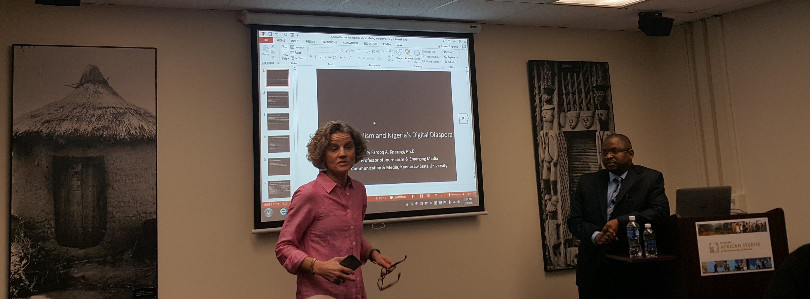On Friday January 13th, Farooq A. Kperogi gave a Baraza presentation titled, “Citizen Journalism and Nigeria’s Digital Diaspora.” Kperogi is Associate Professor of Journalism & Emerging Media in the School of Communication & Media at Kennesaw State University. He also writes two columns a week for the Daily Trust, a prominent newspaper in Nigeria, as well as maintains an influential political blog accessible here.
 Kperogi’s presentation focused on the ‘online citizen journalism’ that is carried out by the Nigerian diaspora. His research thesis investigates how people who are voluntarily displaced from their homeland, re-territorialize and then engage in media outreach with their homeland in dynamic or influential ways. Also referring to these communities as “digital diasporas” or “transnations of diasporic communities”, Kperogi argues that media and migration are inextricably connected. Further, the strong media influence of diasporic communities has resulted in a ‘contra flows’ phenomenon where, instead of the historic domination of the media by the West, which then flows to the Rest, contra flows refer to a discourse which subverts that informational flow. Now the prominence of diasporic media sources has resulted in Western audiences accessing these media links.
Kperogi’s presentation focused on the ‘online citizen journalism’ that is carried out by the Nigerian diaspora. His research thesis investigates how people who are voluntarily displaced from their homeland, re-territorialize and then engage in media outreach with their homeland in dynamic or influential ways. Also referring to these communities as “digital diasporas” or “transnations of diasporic communities”, Kperogi argues that media and migration are inextricably connected. Further, the strong media influence of diasporic communities has resulted in a ‘contra flows’ phenomenon where, instead of the historic domination of the media by the West, which then flows to the Rest, contra flows refer to a discourse which subverts that informational flow. Now the prominence of diasporic media sources has resulted in Western audiences accessing these media links.
Kperogi explains that the rise of Nigerian diasporic media sources was the result of a dearth of critical journalism in Nigeria, a delay in the technological quality of online news sources coming from Nigeria, and the geographic distance (which also serves as protection) of diaspora citizen media practitioners from the homeland. The print media has always been inextricably linked to democracy in Nigeria, and now both online and print sources are central in sustaining Nigeria’s progress toward democracy. Finally, Kperogi’s talk concluded with a discussion of the immense, and possibly undue, influence of the diaspora for Nigerian politics. This influence translates into the government’s viewing of the diaspora, and diasporic concerns, as more legitimate than domestic voices and results in the Nigerian government responding more directly to Nigerian reports from abroad.